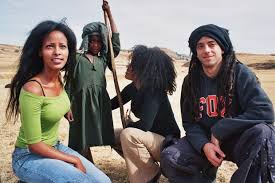Learn about Ethiopian Jews and Operation Solomon through film!

Falasha: Exile of the
Black Jews.
NY: Wellspring Media, 2004. DVD, 80
min.
The story of
Ethiopian Jews and the politics that caused the Israeli government to airlift
7,000 Ethiopian Jews out of the Sudan to Israel from Nov. 24, 1984 to Jan. 6,
1985. Produced by Jamie Boyd and Simcha Jacobovici. (For grades 9 - adult).
Live and Become
Israel: Menemsha
Films, 2009, DVD, 140 mins.
This film centers on the beginning of
"Operation Moses" airlift of Beta-Israel to Israel. A
Christian woman in a Sudanese refugee camp wants a better life for her
nine-year- old son in Israel. An Ethiopian Jewish woman, whose son has recently
died, agrees to pass the boy off as her own son, but in Israel, the adopted
mother dies. He is adopted by a liberal Israeli couple with two children. The wife
becomes a fiery defender of the boy against the prejudices he faces as he
begins a new life. Written and directed by Ra-du Mihaileanu.
(For grades 9 - adult).

The Name My Mother Gave Me.
Israel: Ruth
Diskin Films, 2009. 56 min., DVD.
A documentary about Ethiopian and Russian
Israelis who meet at a leadership program in Israel. The program culminates in
a joint journey to Ethiopia. In Israel, the participants are not always readily
accepted. However, in Ethiopia, they discover the universality of their
experiences and their shared commitment to Israel. Directed by Eli Tal-El.
These Are My Names.
Israel: Ruth Diskin Films, 2010. 30 min, DVD.
A documentary film by Ruth Mason and Naomi Miller Altaraz.
Among the cultural treasures Ethiopian Jews brought with them to
Israel were their names. But like the status of their rabbis, the
influence of their elders and the support of their extended families,
these names were taken away upon arrival in Israel. The newly released
documentary, These are my Names, explores the experiences and identity
conflicts of Israel’s new Ethiopian citizens through the prism of their
original names – names that carry a depth of meaning and connection not
found in the West.
In the 30-minute film by Ruth Moussaioff Mason and Naomi Miller
Altaraz, we meet young Ethiopian Israelis whose original names take them
back to childhoods in nature, to the hunger and fear in Sudanese
refugee camps, to longing for loved ones who disappeared or died on the
journey to Israel, to denial of their identity…and a return to their
roots.
I Had a Dream.
Doc., 52 Min., DVD/MiniDV, color, 2009)
- Directed by: Tezeta Germay
- Produced by: Micha Shagrir, Tapuz Communication Ltd
- Language: Hebrew,Amaharic, English subtitles
As a young boy, born into a closed and isolated community in Ethiopia,
far from the centers of the Jewish world, Yona Bugale was brought to
Europe, where he discovered his common heritage with the Jewish people.
Yona Bugale himself did not live to see the realization of his dream and
life’s work, yet he worked ceaselessly as a teacher and community
leader, promoting connections with the State of Israel and with Jewish
organizations, in order to prevent the possible destruction of Ethiopian
Jewry. Based on rare archival material, the film’s aim is to expose
and preserve not only an extraordinary life story, but also, to give
expression to the complexity of the Ethiopian aliyah and of their
absorption in Israel.

Black Over White
by Tomer Heyman
2007 | Israel |
50 min. |
Amharic, English, Hebrew
| Original Title: Shachor Al Lavan

